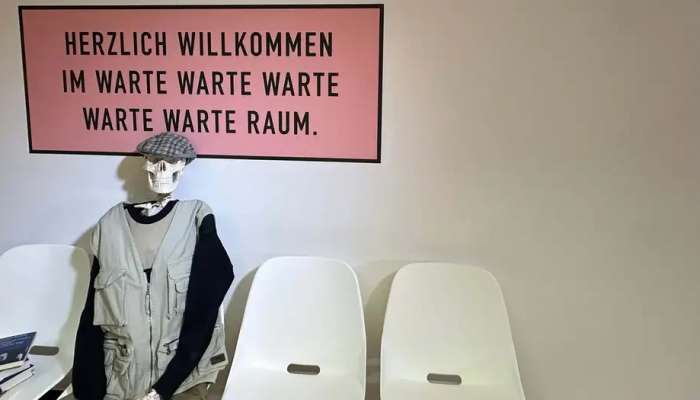
Berlin: Germany is notorious for its bureaucracy. One of the central pledges of the centre-left government was to slash through the thicket of laws and rules. But many feel the new legislation due to be agreed by parliament at the end of June falls far short of what is necessary.
Now, the Initiative for a New Social Market Economy (INSM), a market-liberal lobbying organisation, has created a pop-up museum designed to turn up the heat on the German government — complete with a marketeer's take on an S&M bondage-style dark room.
"There is bureaucracy in all countries, but this has become the No. 1 disadvantage for Germany as a business location — ahead of taxes and energy prices," said Thorsten Alsleben, managing director of the INSM, which is financed by the employers' associations of the metal, electrical and automotive industries.
Alsleben said that was reason enough for 58% of companies to decide against investing in Germany, accusing German politics and bureaucracy of killing innovation and entrepreneurial spirit.
A waiting game
German bureaucracy is time-consuming — for companies and for individuals. Many services, such as applying for a driver's licence or an identity card, involve in-person appointments, and just getting a slot can be difficult.
According to the Bureaucracy Museum, visits such as these take 2 hours and 21 minutes on average. And overall, small and medium-sized businesses devote on average 13 hours a week to their paperwork.
The word paperwork is well-chosen here. Museum visitors enter through a display resembling a hollowed-out tree, to symbolize the 52 trees felled each day for the paper to feed the central government's administrative machine.
Delays and dizzying digital diversity
Germany is a laggard in terms of digitalisation compared to other European nations, and e-government is one of its worst-performing areas. The continued prevalence of fax machines in government offices has become a symbol of this failure.
In response to an EU ruling, a law was introduced in 2017 obliging authorities to make some 580 services digitally accessible by the end of 2022. But only 81 were fully up and running at the start of 2024, with 96 partially up. Why so little, so late?
Blaming federalism is too easy, Corinna Funke, from the agency GFA Public, told DW. Canada and other federal nations are outperforming Germany in the digital competitiveness rankings.
Germany's approach, she said, remains too decentralized, spawning a dizzying variety of software and hardware for similar services in different places and rival platforms.
"In the digital space, quality depends heavily on having a single platform everyone knows, with the same templates, design, one-stop shops and common standards," Funke said.
She also blames the slow pace of digitalisation on a lack of public service culture, adding that this had historical roots. While the rule of law and efficient administration processes were established under Prussian rule, in Anglophone countries, the Nordic states and the Netherlands, democracy came first.
"This is where these different self images come from — of public servants on the one hand and bureaucrats, or state servants, on the other," Funke said. "The most important values and norms in the administrations of bureaucratic countries are not so much efficiency or being citizen-friendly or saving taxpayers money. It is very often about implementing the law."
Number of laws out of control
Sometimes there are bewildering contradictions, said Alsleben. "The work health and safety office might tell a bakery that they need to install tiles with non-slip ridges, then the health office says smooth ones are needed for the sake of hygiene," he added.
And the number of laws and regulations has spiraled out of hand, he added. At the Bureaucracy Museum visitors can pick out their least favorite ones and have them put through the paper shredder.
Alsleben said risk aversion and distrust of businesspeople were to blame. "That leads to the attempt to try to cover every single possible case in regulation," he said. Alsleben believes there are too many lawyers and legal experts in parliament and the administrative apparatus and not enough people with business experience.
The INSM is calling for workshops in which policymakers and small and medium-sized enterprises test the practicability of planned legislation.
Lobby groups and creative bureaucrats
Ines Mergel, professor of public administration at the University of Konstanz, said the private sector was partly responsible for so many laws itself.
"Lots of lobbying goes into policy-making," she said. "Often, civil servants and policymakers have created a rather broad policy and then every time something goes wrong we also need an addition to that policy — to also capture all the exceptions. Lots of laws have evolved over time, and it was never the intent to regulate as much as possible, but it is a societal process that happens between all these different actors."
Better communication and less top-down government would also help the functioning of the public sector, Mergel said. "I would like more conversation and cooperation across the levels of government."
German bureaucracy can drive people mad but perhaps it's just a bit too easy to make civil servants into the nation's whipping girls and boys. Johanna Sieben, the head of the Creative Bureaucracy Festival, said that, at the local level in particular, under-funding and staff shortages are also obstacles to change.
The festival is an international event held in Berlin that was set up to encourage change from within the government. It showcases good practice examples.
The wheels of German bureaucracy may move slowly, but the pop-up museum will not be around for long. It will be consigned to history on June 25 and hopes to take a large chunk of red tape with it. Only time will tell if that €500,000 investment was well spent.